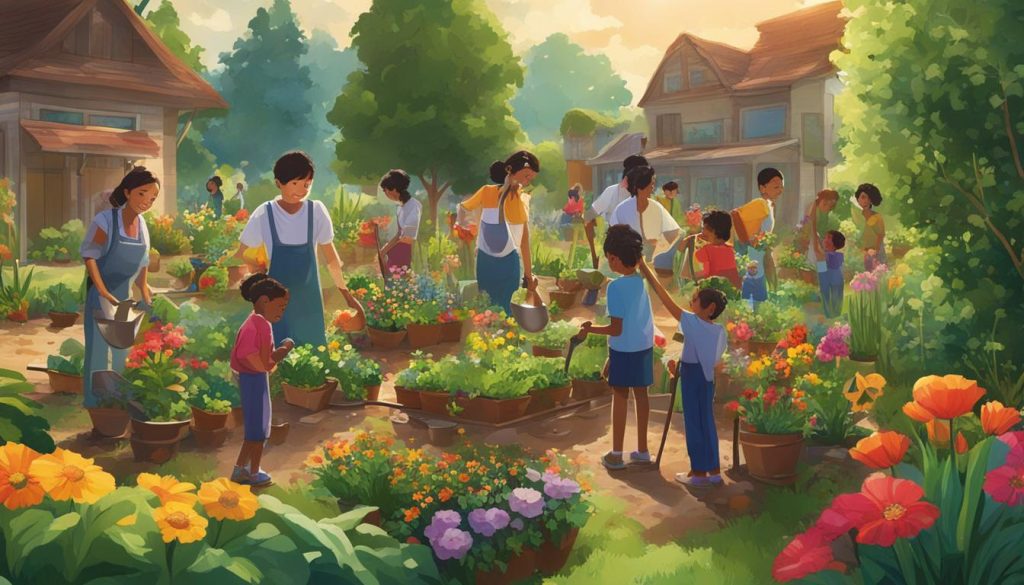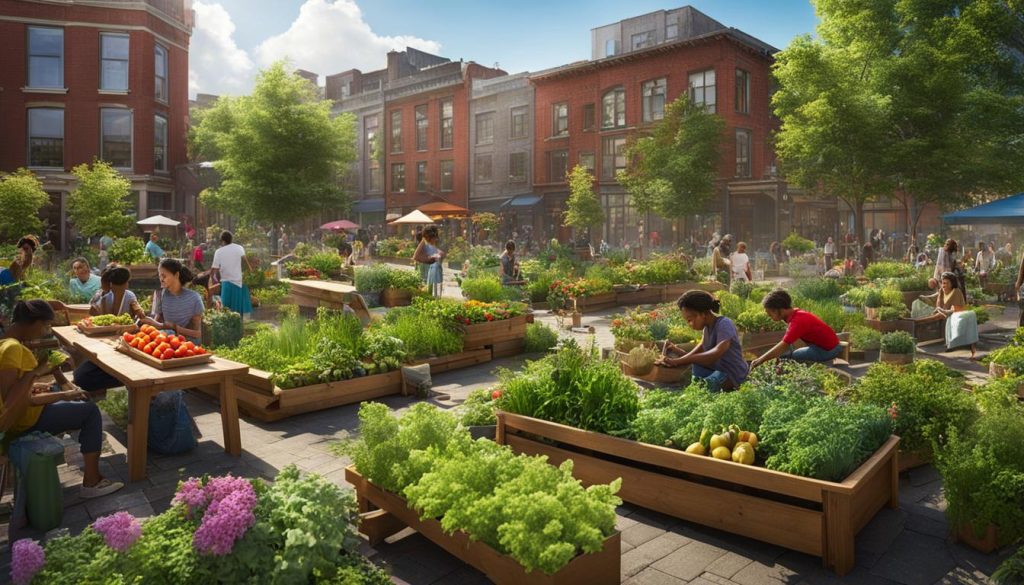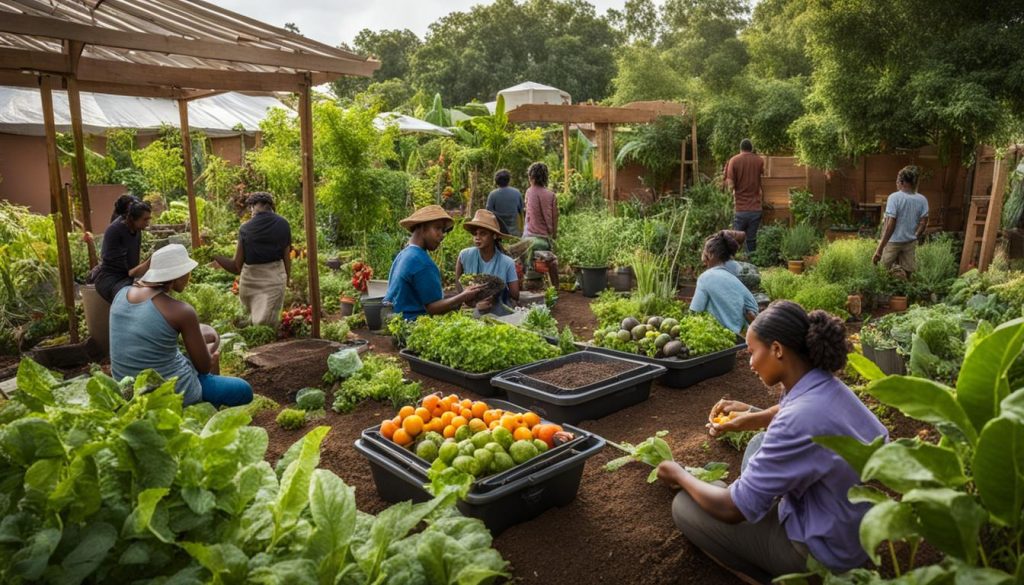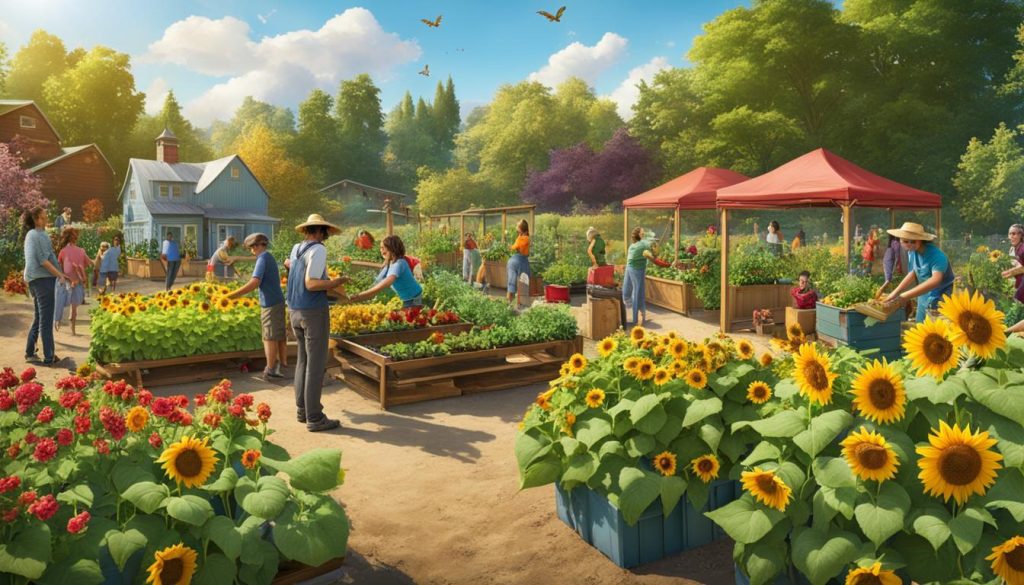Imagine a garden that not only offers a beautiful outdoor space for socializing but also provides therapeutic benefits for our mental and physical well-being. A haven where we can find relaxation, forge social connections, and nurture our sense of community. Welcome to the Social Wellness Garden, a place where the power of nature and human interaction come together to cultivate a community of care.
In this garden for social wellness, individuals from all walks of life can experience the healing qualities of nature. Whether you are seeking solace, a space for reflection, or simply a place to connect with others, the Social Wellness Garden is here to embrace you.
This community garden is designed with mental health and social connection in mind. It serves as a therapeutic space where individuals can find respite from the stresses of daily life and foster a sense of belonging. The garden’s serene atmosphere and carefully curated elements create an environment that promotes relaxation and socialization.
Key Takeaways:
- The Social Wellness Garden is an outdoor space designed for socializing and promoting mental health.
- It offers therapeutic benefits and a sense of community for individuals from diverse backgrounds.
- The garden is a space for relaxation, social connection, and personal well-being.
- It fosters a sense of belonging and provides a respite from the stresses of daily life.
- Through nature and human interaction, the garden cultivates a community of care.
The Role of Community Resilience and Well-being
Community resilience and well-being are interlinked and crucial aspects of building a sustainable and thriving society. Alternative agriculture practices, such as community gardens, play a significant role in promoting both individual and social-ecological resilience. These gardens provide spaces for agency and self-organization, which are key mechanisms in community resilience.
Community gardens strengthen people-place relationships and foster social networks within communities. By engaging in gardening activities, individuals develop a sense of agency and empowerment, gaining control over their food sources and breaking free from reliance on industrialized systems. These gardens also contribute to social well-being by promoting a sense of community and providing opportunities for physical and mental health benefits.
Furthermore, community gardens are instrumental in enhancing social-ecological resilience. They provide opportunities for individuals and communities to adapt to changing conditions by building relationships and engaging in collective action. The act of gardening together not only strengthens community bonds but also fosters resilience in the face of challenges.
The Importance of Alternative Agriculture
Alternative agriculture, such as community gardening, plays a vital role in promoting food systems resilience. By diversifying food production and reducing dependency on centralized systems, community gardens contribute to the overall sustainability of local food systems. This decentralized approach enhances the resilience of communities, ensuring a more secure and equitable food supply.
Additionally, community gardens serve as educational platforms for sustainable agriculture practices. They offer opportunities for individuals to learn about organic techniques, companion planting, and other sustainable practices. Through workshops and educational programs, community gardens empower individuals with the knowledge and skills to create a more sustainable and resilient future.
| Community Resilience | Well-being | Alternative Agriculture | Social-Ecological Resilience | Food Systems Resilience |
|---|---|---|---|---|
| Strengthens community bonds | Promotes physical and mental health | Empowers individuals and communities | Fosters social-ecological resilience | Diversifies food production |
| Supports collective action | Provides opportunities for social interaction | Reduces reliance on centralized systems | Enhances adaptive capacity | Inspires sustainable agriculture practices |
The Power of Sociality in Community Resilience
When it comes to building resilient communities, sociality plays a crucial role. Sociality refers to the dynamic social relations that enable communities to come together, coordinate actions, and adapt to changing conditions. It is through social interaction and community-level agency that relationships are built, and collective action for resilience is fostered. In the context of community gardens, sociality thrives, providing a space for individuals to connect, collaborate, and find solace in the power of community.
“Community gardens serve as a bridge that connects people from diverse backgrounds and fosters a sense of belonging and shared purpose.”
By creating opportunities for community interaction, these gardens cultivate a sense of belonging and shared purpose. People come together to cultivate the land, exchange gardening tips, and learn from one another. This interaction strengthens social bonds and empowers individuals to make positive changes at the community level. Through the act of gardening, people not only grow plants but also build relationships that contribute to the overall social fabric of the community.
Community gardens also provide a platform for collective action and community-level agency. In these spaces, individuals can come together to address community challenges, advocate for change, and work towards common goals. Whether it’s organizing workshops on sustainable gardening practices or initiating community-wide composting programs, community gardens are catalysts for positive social change.
The Benefits of Community Interaction:
- Building relationships and fostering a sense of belonging
- Sharing knowledge and learning from others
- Empowering individuals to make positive changes at the community level
- Creating opportunities for collective action and community-level agency
Through the power of sociality, community gardens not only contribute to individual well-being but also strengthen the resilience of the entire community. As people come together, build relationships, and work towards common goals, they create a supportive network that can withstand and adapt to challenges. Community gardens are more than just spaces for growing food; they are nurturing grounds for social connection, empowerment, and the building of resilient communities.

Community Gardens as Catalysts for Social Change
Community gardens have emerged as powerful catalysts for social change, empowering individuals and communities to reclaim control over their food sources and break free from the constraints of industrialized society. These gardens go beyond mere food production; they foster a sense of empowerment, self-sufficiency, and resilience among participants. By bringing people together from diverse backgrounds, community gardens break down social barriers and create a sense of unity, promoting social cohesion and fostering a greater sense of well-being.
The impact of community gardens extends far beyond their physical presence. They serve as platforms for social interaction, educational opportunities, and grassroots movements. Through these gardens, people connect with one another, share knowledge, and learn sustainable gardening practices. As participants engage in the cultivation of their own food, they gain a deeper understanding of the importance of local entrepreneurship, environmental stewardship, and sustainable living.
“Community gardens break down social barriers and create a sense of unity, promoting social cohesion and fostering a greater sense of well-being.”
These grassroots movements not only transform vacant lots into thriving gardens but also inspire individuals to take an active role in their communities and advocate for positive change. Community gardens have the power to reshape neighborhoods, improve access to fresh produce, and promote food justice. By fostering a connection with nature and the environment, these gardens encourage individuals to become more mindful of their consumption habits and make healthier, more sustainable choices.
Empowerment Through Community Gardens
One of the key elements of community gardens is the empowerment they provide to individuals and communities. Participants gain a sense of ownership and agency over their food sources, breaking free from dependency on industrialized systems. They develop practical skills in sustainable gardening, which can be applied to their own homes and shared with others. Through the collective effort of growing food together, community gardens nurture a sense of self-sufficiency, resilience, and empowerment among participants.
Community gardens also serve as educational spaces, fostering a sense of camaraderie and collaboration among participants. They promote social learning, knowledge sharing, and the transmission of gardening tips and techniques. By creating opportunities for dialogue and exchange, community gardens become hubs for transformative education, inspiring individuals to become change agents within their own communities.
| Community Gardens: Empowering Individuals and Communities | Benefits |
|---|---|
| 1. Sense of ownership and agency | Participants take control of their food sources and break free from industrialized systems. |
| 2. Practical skills in sustainable gardening | Participants develop skills that can be applied to their own homes and shared with others. |
| 3. Sense of self-sufficiency and resilience | Participants cultivate resilience and a sense of self-sufficiency through collective gardening efforts. |
| 4. Social learning and collaboration | Community gardens foster camaraderie, collaboration, and knowledge sharing among participants. |
Community gardens have the power to ignite social change, promote empowerment, and foster a sense of connection and well-being among individuals and communities. Through their transformative impact, these gardens inspire us to rethink our relationship with food, nature, and the communities we live in.
Community Gardens in Urban Greening Movements
Urban greening movements are transforming vacant lots into vibrant community gardens, revitalizing neighborhoods and promoting sustainability. These community gardens provide more than just green spaces; they offer educational opportunities, contribute to ecosystem services, and engage residents in the process of urban revitalization.
Through the transformation of vacant lots, community members reclaim their neighborhoods and create thriving green spaces that benefit both the environment and the local community. These gardens not only beautify the urban landscape but also serve as outdoor classrooms, providing valuable education on sustainable gardening practices and fostering environmental stewardship.
The benefits of community gardens in urban greening movements extend beyond the physical environment. They create spaces for social interaction and engagement, bringing people together from diverse backgrounds and fostering a sense of community. As individuals work side by side in the garden, they form connections, develop new friendships, and build a network of mutual support.
“Community gardens are a powerful tool for building more sustainable and resilient cities. They create a sense of place, offer educational opportunities, and bring communities together in pursuit of a common goal.”
– Jane Smith, Urban Gardening Advocate
Table: Benefits of Community Gardens in Urban Greening Movements
| Benefits | Description |
|---|---|
| Educational Opportunities | Community gardens serve as outdoor classrooms, teaching sustainable gardening practices and promoting environmental education. |
| Sustainability | By transforming vacant lots into green spaces, community gardens contribute to the overall sustainability of urban environments. |
| Ecosystem Services | Community gardens provide essential ecosystem services such as improved air quality, enhanced biodiversity, and stormwater management. |
| Community Engagement | These gardens foster social interaction, bringing people together and creating a sense of community and belonging. |

Beyond Food Production: Community Bonding and Education
In community gardens, the benefits extend far beyond just growing fresh produce. These gardens serve as spaces for community bonding and education, bringing people of different ages, backgrounds, and skill levels together. As I wandered through the lush greenery of the Social Wellness Garden, I witnessed firsthand the camaraderie and collaboration that flourishes within these vibrant spaces.
Gardening provides a unique opportunity for individuals to connect with each other, sharing gardening tips and tricks, exchanging knowledge, and learning from one another’s experiences. Whether it’s a seasoned gardener sharing their expertise or a novice discovering the joy of planting their first seed, the sense of accomplishment and fulfillment that comes from nurturing plants creates a deep bond among community members.
“Working together in the garden has taught me the power of collective action,” shared Lisa, one of the garden’s dedicated volunteers. “We learn from each other, we support each other, and we grow together, both as individuals and as a community. It’s truly inspiring.”
Community gardens also play a vital role in educating individuals about sustainable gardening practices. Workshops and educational programs hosted in these gardens provide valuable insights into organic techniques, composting, companion planting, and other sustainable practices. Participants gain firsthand knowledge on how to create thriving garden ecosystems while minimizing their environmental impact.
| Gardening Tips | |
|---|---|
| 1 | Use compost to enrich the soil and promote healthy plant growth. |
| 2 | Practice companion planting to naturally deter pests and improve crop yields. |
| 3 | Water plants deeply and infrequently to encourage deep root growth. |
| 4 | Rotate crops annually to prevent soil depletion and reduce the risk of pests and diseases. |
By embracing sustainable gardening practices, individuals not only contribute to the well-being of their garden but also become environmental stewards, creating a more sustainable future for their community. Through community bonding and education, these gardens become catalysts for positive change, fostering social connections, and empowering individuals to make a difference.

Strategies for Optimal Growth in Community Gardens
When it comes to cultivating a thriving community garden, implementing organic techniques and sustainable practices is key. By adopting these strategies, we can ensure that our gardens not only produce healthy and nutritious crops but also contribute to the overall well-being of our community and the environment.
One of the fundamental principles of organic gardening is the use of companion planting. By carefully selecting combinations of plants that benefit each other, we can create natural pest management systems and improve soil fertility. For example, planting marigolds alongside tomatoes can deter harmful insects, while beans help replenish nitrogen in the soil for neighboring plants.
Composting is another essential practice in organic gardening. By recycling kitchen scraps and garden waste, we can create nutrient-rich compost that enhances soil health and fertility. Applying compost to the garden beds regularly ensures that our plants have access to the vital nutrients they need to thrive.
Organic pest control methods are also crucial in maintaining a healthy and balanced garden ecosystem. Rather than relying on harmful synthetic chemicals, we can use natural alternatives such as neem oil, garlic spray, and insect-repelling plants to control pests effectively. These methods not only protect our crops but also safeguard the health of pollinators and beneficial insects in our garden.
Table: Organic Techniques and Sustainable Practices in Community Gardens
| Technique/Practice | Description |
|---|---|
| Companion Planting | Planting compatible species together to improve pest resistance and soil fertility. |
| Composting | Recycling organic waste to create nutrient-rich compost for soil enrichment. |
| Organic Pest Control | Using natural methods and repellents to manage pest populations without harmful synthetic chemicals. |
By adopting these organic techniques and sustainable practices in our community gardens, we can create thriving and resilient ecosystems that benefit both people and the planet. Not only will our crops be free from harmful chemicals, but we will also contribute to the preservation of biodiversity and the health of our local environment. Together, let’s cultivate gardens that nourish our bodies, promote social connection, and inspire a sustainable future.

Conclusion
In conclusion, community gardens are not just about growing vegetables and fruits; they are about cultivating a community of care and resilience. These gardens serve as powerful catalysts for social change, empowering individuals and communities to take control of their food sources, promoting self-sufficiency, and breaking down social barriers. By transforming vacant lots into green spaces, community members reclaim their neighborhoods, foster a sense of well-being, and provide vital ecosystem services.
Moreover, community gardens go beyond food production. They create spaces for community bonding and education, bringing people together from different backgrounds and skill levels. These gardens offer valuable educational opportunities, inspiring environmental stewardship and teaching sustainable gardening practices. Workshops and programs hosted in community gardens enrich the learning experience, fostering camaraderie and collaboration among participants.
Implementing organic techniques in community gardens promotes healthier soil, plants, and produce that are free from harmful chemicals. Through companion planting and sustainable practices, community gardens create natural pest management systems and improve soil fertility, contributing to their long-term sustainability. These strategies not only benefit the gardens but also have a positive impact on the environment.
Overall, community gardens are spaces where people can connect, learn, and grow together. They demonstrate the power of collective action and the enduring human need to connect with nature. By fostering social connections, promoting well-being, and contributing to the overall sustainability of urban environments, community gardens play a vital role in creating resilient communities.
FAQ
What is the purpose of a community garden?
Community gardens serve as spaces for community bonding, education, and social change. They provide opportunities for gardening, knowledge sharing, and skill-building.
How do community gardens contribute to community resilience?
Community gardens play a crucial role in building community resilience by strengthening people-place relationships, fostering social networks, and promoting self-organization. They provide a space for social interaction, collective action, and adaptation to changing conditions.
Can community gardens have a positive impact on the environment?
Yes, community gardens contribute to the sustainability of urban environments by reclaiming vacant lots, promoting green spaces, and providing vital ecosystem services. Organic gardening techniques used in community gardens promote healthier soil and plants while reducing the use of harmful chemicals.
What are the benefits of participating in a community garden?
Participating in a community garden promotes social connections, well-being, and a sense of self-sufficiency. It offers opportunities for education, camaraderie, and collaboration. Community gardens also provide access to fresh, organic produce and serve as spaces for relaxation and socialization.
How can I get involved in a community garden?
To get involved in a community garden, you can reach out to local gardening organizations, community centers, or neighborhood associations. They can provide information on existing community gardens, volunteer opportunities, or guidance on starting your own garden.

